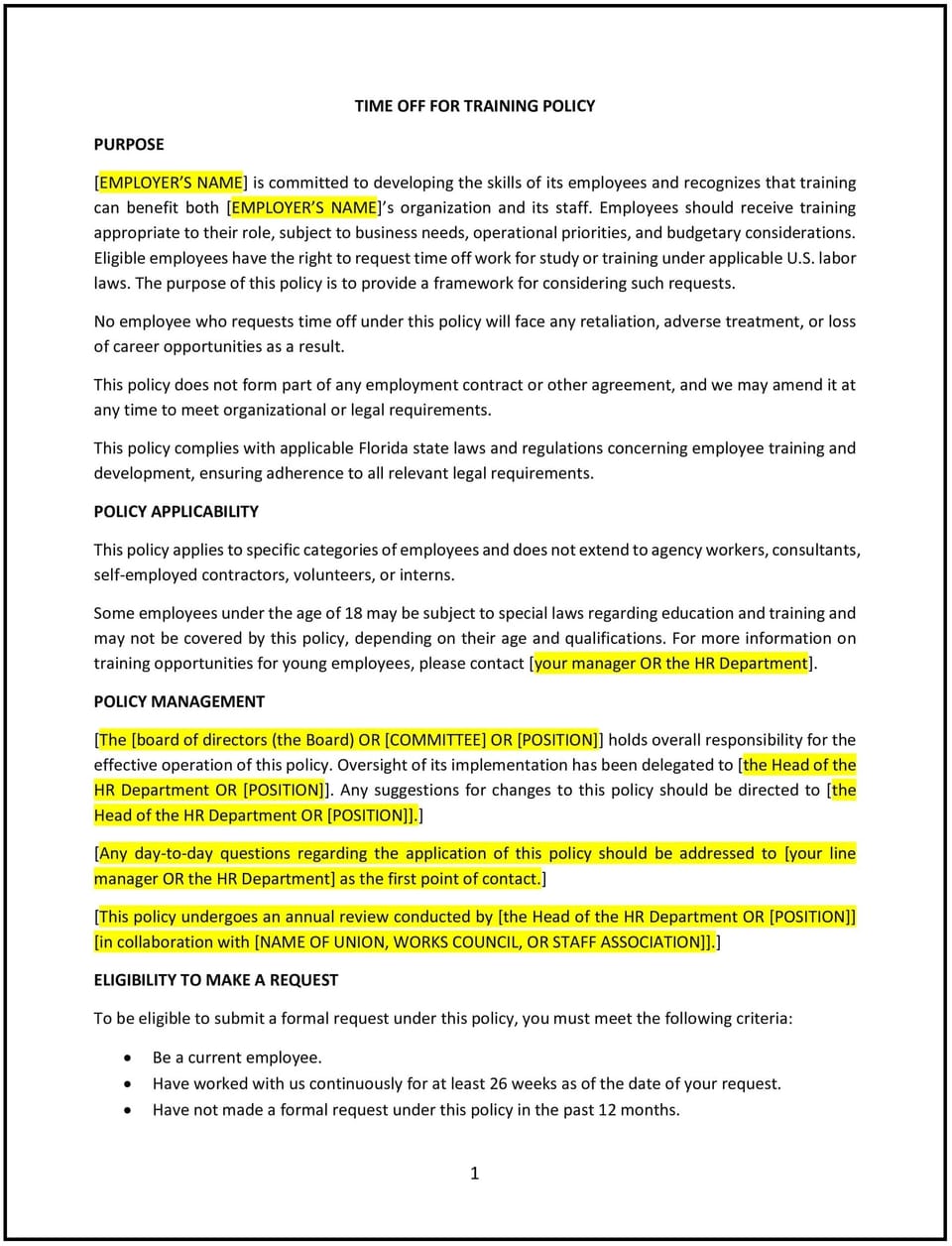Time off for training policy (Florida): Free template

Time off for training policy (Florida)
A time off for training policy helps Florida businesses establish guidelines for allowing employees to take time off to attend training and professional development activities. This policy outlines procedures for requesting, approving, and managing time off for training while maintaining operational efficiency. It is designed to promote employee development, reduce conflicts, and provide clear expectations for managing training-related time off.
By implementing this policy, businesses in Florida can demonstrate their commitment to employee growth, enhance operational efficiency, and align with the state’s focus on fostering a skilled and adaptable workforce.
How to use this time off for training policy (Florida)
- Define eligible training: Clearly specify what types of training qualify for time off, such as professional courses, workshops, seminars, or conferences.
- Establish request procedures: Outline how employees should request time off for training, including whom to contact and how to document requests.
- Address approval criteria: Explain how businesses should evaluate training requests based on factors such as job relevance, cost, and business impact.
- Specify leave terms: Explain whether the leave is paid or unpaid and any conditions that apply, such as pre-approval requirements or documentation.
- Communicate expectations: Clarify the business’s expectations regarding scheduling, work coverage, and returning to work after attending training.
- Communicate the policy: Share the policy with employees during onboarding and through regular communications to ensure awareness and understanding.
- Monitor adherence: Regularly review how the policy is applied and address any concerns or discrepancies promptly.
- Update the policy: Periodically assess the policy to reflect changes in workplace dynamics, legal standards, or business needs.
Benefits of using this time off for training policy (Florida)
This policy offers several advantages for Florida businesses:
- Promotes employee development: Supporting training helps employees enhance their skills and advance their careers.
- Reduces conflicts: Defined procedures minimize misunderstandings or disputes about time-off requests.
- Builds goodwill: A policy that supports training fosters loyalty and trust among employees.
- Aligns with community values: Reflects Florida’s emphasis on professional development and lifelong learning.
- Enhances workplace culture: A policy that prioritizes training fosters a positive work environment and a culture of continuous improvement.
- Improves retention: Offering training opportunities contributes to higher employee satisfaction and loyalty.
- Supports growth: A robust policy facilitates the development of a skilled and adaptable workforce.
Tips for using this time off for training policy (Florida)
- Communicate clearly: Ensure employees understand the policy by providing written materials and discussing it during meetings or training sessions.
- Train managers: Educate supervisors on how to handle training-related time-off requests fairly and consistently.
- Be flexible: Consider offering additional accommodations, such as flexible hours, to support employees attending training.
- Track requests: Maintain records of training-related time-off requests and approvals to monitor trends and ensure fairness.
- Stay informed: Keep up with changes in workplace expectations, legal standards, or best practices that may affect training policies.
- Encourage feedback: Solicit input from employees to identify areas for improvement and ensure the policy meets their needs.
- Review periodically: Assess the policy’s effectiveness and make updates as needed to reflect changes in workplace dynamics or business goals.
Q: Why should Florida businesses adopt a time off for training policy?
A: Businesses should adopt this policy to promote employee development, reduce conflicts, and demonstrate their commitment to supporting training opportunities.
Q: What types of training should be included in the policy?
A: Businesses should include professional courses, workshops, seminars, conferences, and other learning activities that enhance job-related skills.
Q: How should businesses handle scheduling conflicts caused by training time off?
A: Businesses should work with employees to find solutions, such as adjusting shifts, redistributing tasks, or allowing remote work where feasible.
Q: What documentation should businesses require for training time off?
A: Businesses should request reasonable documentation, such as a training confirmation or agenda, to verify the need for leave.
Q: How can businesses communicate the policy effectively?
A: Businesses should share the policy through multiple channels, such as emails, meetings, and employee handbooks, and encourage questions to ensure clarity and understanding.
Q: Should businesses require pre-approval for training time off?
A: Businesses should require pre-approval for training time off to ensure that the training aligns with business needs and operational requirements.
Q: How often should businesses review the policy?
A: Businesses should review the policy annually or whenever there are significant changes in workplace dynamics, operational needs, or legal requirements.
This article contains general legal information and does not contain legal advice. Cobrief is not a law firm or a substitute for an attorney or law firm. The law is complex and changes often. For legal advice, please ask a lawyer.


